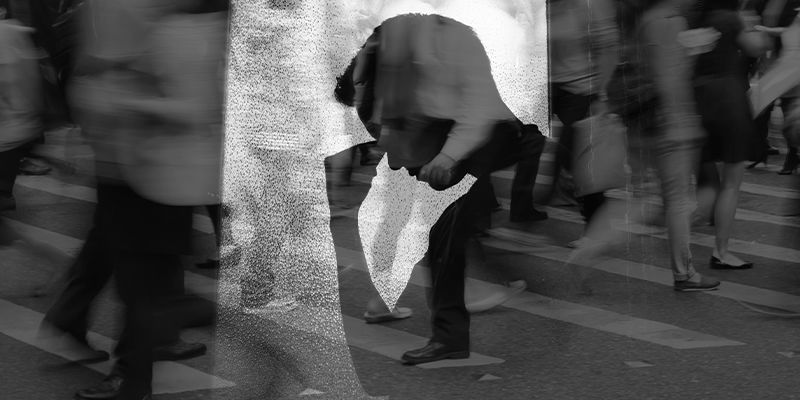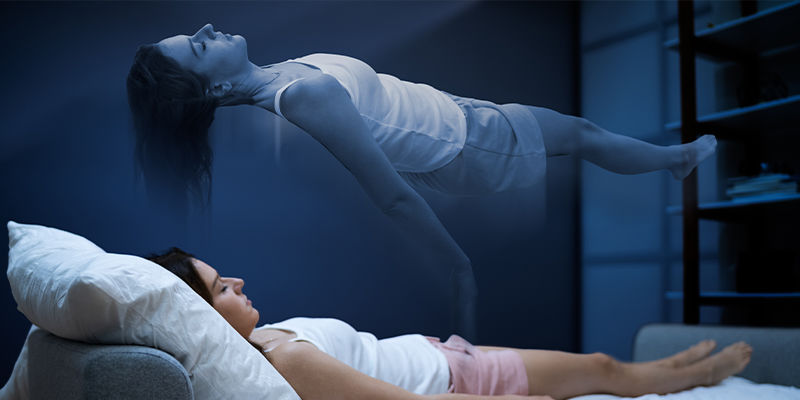
Does Lucid Dreaming Cause Derealisation Or Depersonalisation?
Lucid dreaming introduces us to whole new realities, but can it detach us from the everyday, waking reality? In this article, we explore what we know—and don't know—about the relationship between lucid dreaming and two symptoms of dissociative disorders: derealisation and depersonalisation.
Learning to lucid dream is a goal many have, but the journey can actually be fairly difficult. Some people may find it intuitive and easy, but most struggle with it, at least at first. If you manage to do it, lucid dreaming can change your perception of yourself and reality—mostly for the better.
However, in a small number of people, it appears to exacerbate two symptoms common to dissociative disorders: derealisation and depersonalisation. In this article, we explore these two conditions, and ask what effects lucid dreaming may have on them.
The impact of lucid dreaming
Lucid dreaming, if you can achieve it, is a fascinating adventure that, as well as enriching your nights, can have a number of effects on your waking life too. This is why many people choose to begin doing it in the first place. Lucid dreaming can help people work through internal issues, deal with fears they can’t face in their waking lives, or otherwise plumb the depths of their subconscious in the hope of understanding themselves more thoroughly.
However, lucid dreaming doesn’t always have beneficial effects, and it can potentially cause some distressing side effects. Two of these are derealisation and depersonalisation; losing a sense of reality, and losing a sense of self, respectively.
What is derealisation?

Derealisation is an interesting and fairly uncommon psychological disorder. Simply put, those who suffer from this condition periodically feel as though they are detached from the world; that it is unreal.
In the vast majority of cases, derealisation occurs as a consequence of childhood trauma, where detaching from the world acts as a defence mechanism against continued sources of harm. It can take much therapy to help someone who experiences derealisation as a consequence of this. However, for those who develop it through lucid dreaming, it seems that ceasing the practice should bring someone back to reality fairly quickly.
Derealisation can cause other, secondary conditions, such as depression and anxiety, as it can stop people from being able to properly connect with the world and the people in it.
Signs of derealisation
- Brain fog
- A sense of seeing the world through a veil
- The world and people in it appear fake
- Sights and sounds appear “wrong”
- Life feels vague, like a dream
What is depersonalisation?
Depersonalisation is similar to derealisation, except a person feels detached from themselves—from their body, thoughts, and emotions—rather than from the world around them.
These episodes can last for any period of time (between a few minutes and years) and, once again, are thought to be the result of childhood trauma, in most instances. Occasionally, depersonalisation can be linked to brain damage or other psychiatric disorders.
Depersonalisation can be very distressing, as people can feel like they are on autopilot and/or lack agency in the world.
Signs of depersonalisation
- Feeling as though you’re in a dream
- A lack of control over one’s actions
- Feeling as though you are just observing your actions
- The sense of being separate from your thoughts and feelings
How does lucid dreaming influence derealisation and depersonalisation?

Scientific research into the effects of lucid dreaming is scarce, but anecdotal reports suggest that a minority of people who lucid dream may develop some degree of derealisation/depersonalisation.
As well as the classic symptoms (listed above), derealisation and depersonalisation from lucid dreaming may cause individuals to struggle to distinguish the real world from dream worlds, and to potentially confuse memories from dreams as memories from real life. Thoughts, the experience of having a body, and the experience of being in the world are wildly different in dreams compared to everyday, waking life. Therefore, as the brain spends more time in these lucid dream states, the distinction between waking reality and dream reality can become blurred.
Both of these conditions exist under the umbrella term of dissociative disorders, and are not mutually exclusive. In fact, diagnosing one or the other can, at times, be very difficult.
Does lucid dreaming have the potential to worsen derealisation and depersonalisation?
For those who already suffer from these states, it seems that lucid dreaming might make them worse. However, scientific evidence is basically nonexistent, so we’re relying mostly on anecdotal evidence to make this assessment.
Poor sleep can also make these conditions more severe, and lucid dreaming can sometimes disrupt healthy sleep patterns, which could in turn increase the occurrence of derealisation or depersonalisation.
Take the steps to a better night’s sleep
Ultimately, it’s unclear what effect lucid dreaming might have regarding derealisation and depersonalisation. If these are conditions you already struggle with, you should certainly consider carefully whether lucid dreaming is for you. If you do decide to explore it, proceed with caution.
One key precaution you can take is to ensure that you get a good night’s rest each night. If lucid dreaming causes sleep deprivation, then it’s probably not worth it, even if it doesn't cause either of these conditions.
Just like with drugs, you should ultimately listen to your mind and body in regard to lucid dreaming. If it makes you feel good, then it’s probably worth pursuing. If it makes you feel bad, then perhaps it’s not for you.
-
 4 min
May 30, 2023
How To Make Sleeping A Habit
The power of routine and habit has been known and celebrated for millennia. And it can be applied to sleep as well! Here we explain the importance of forming a sleeping habit, and share 6 helpful...
4 min
May 30, 2023
How To Make Sleeping A Habit
The power of routine and habit has been known and celebrated for millennia. And it can be applied to sleep as well! Here we explain the importance of forming a sleeping habit, and share 6 helpful...
-
 4 min
April 10, 2023
The Best Way To Reality Check For Lucid Dreaming
To gain lucidity in a dream, the dreamer first has to learn to determine whether or not they are dreaming. In this article, we explain how to do that, by performing reality checks.
4 min
April 10, 2023
The Best Way To Reality Check For Lucid Dreaming
To gain lucidity in a dream, the dreamer first has to learn to determine whether or not they are dreaming. In this article, we explain how to do that, by performing reality checks.
-
 8 min
October 10, 2022
How To Use Cannabis To Improve Sleep
Cannabis is used for a wide variety of purposes, including to promote a healthy night's rest. But does weed really benefit your slumber, or does it harm sleep quality? Furthermore, which cannabis...
8 min
October 10, 2022
How To Use Cannabis To Improve Sleep
Cannabis is used for a wide variety of purposes, including to promote a healthy night's rest. But does weed really benefit your slumber, or does it harm sleep quality? Furthermore, which cannabis...
-
 4 min
July 22, 2021
Top 10 Lucid Dreaming Apps For iOS & Android
Lucid dreaming is a sensational experience. Explore new worlds, invent vivid scenarios, or dance with your favourite rockstar—all of this and more is achievable through the art of lucid dreaming....
4 min
July 22, 2021
Top 10 Lucid Dreaming Apps For iOS & Android
Lucid dreaming is a sensational experience. Explore new worlds, invent vivid scenarios, or dance with your favourite rockstar—all of this and more is achievable through the art of lucid dreaming....











 United States
United States








